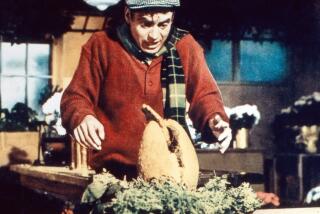Ross Hunter, Prolific Movie Producer, Dies
- Share via
Ross Hunter, the producer who dedicated himself to keeping “all my movies beautiful” and whose exquisitely mounted and surprisingly profitable romantic films sought to give 1950s audiences the glamour of 1930s Hollywood, died Sunday, friends said.
His age was variously reported between 69 and 79.
“He was Hollywood’s best salesman,” said friend and actress Barbara Rush late Sunday. Rush starred in one of Hunter’s films, “Magnificent Obsession.” “And he was just the most fun, the most radiant person--an ‘Uncle Mame.’ ”
His death, at Century City Hospital, was also announced Sunday to an audience at a benefit concert for the AIDS Service Center and AIDS Healthcare Foundation at the Doolittle Theatre in Hollywood--the town where Hunter went from a B-movie acting dropout to a 25-year career as a moneymaking producer at Universal, Columbia and Paramount.
Although his more than threescore films tended to be either bright confections--with stars such as Doris Day, Debbie Reynolds and Julie Andrews--or three-hanky remakes of films such as “Imitation of Life,” which brought Lana Turner back to the limelight, it was as producer of an all-star action-disaster saga, 1970’s “Airport,” that earned Hunter his sole Oscar nomination.
On the principle that audiences should leave the theaters either “laughing or crying,” Hunter produced delightfully sentimental films such as “Magnificent Obsession,” starring his friend Rock Hudson, fripperies like “Tammy and the Bachelor,” tear-jerkers like “Back Street,” matchups between Hudson with Day in films like “Pillow Talk,” and musicals from “Flower Drum Song” and “Thoroughly Modern Millie” to the derided “Lost Horizon,” his last feature film.
“They weren’t great,” he said of his films in 1985, “but they weren’t supposed to be. . . . I gave the public what they wanted--a chance to dream, to live vicariously, to see beautiful women, jewels, gorgeous clothes, melodrama.”
Still, he could be acerbic about his work. “At times,” he said once, “it was tempting to take the Ross Hunter name off them and call the company something like Menopause Productions in honor of the ladies who came for a good cry.”
His most serious effort, producing a film version of the Enid Bagnold play “The Chalk Garden,” won him both critical and commercial success.
It was the gorgeous and glamorous that he sought to restore to film, at a time when movies were becoming grittier. “I never thought sex would become an arena sport, or audiences peeping Toms,” he remarked in the 1970s.
Film guides variously report that Martin Fuss was born between 1916 and 1926 in Cleveland, Ohio. He served in Army intelligence in World War II and was a drama teacher when his students mailed his photo to Paramount. But it was Columbia that eventually gave him a contract.
His brief acting career produced such forgettable B films as “Louisiana Hayride” and “A Guy, a Gal and a Pal,” so he spent nights and weekends learning to be a producer.
At Universal, when he managed to shave $172,000 from the budget of a film called “Flame of Araby,” the delighted studio raised his salary from $60 to $75 a week.
When it came to producing his own films, it was with a formula eventually known as the RH factor--sentimental, with engaging plots of the sort he remembered from when film governed the nation’s manners and tastes.
“Back in Cleveland my father would perk a pot of coffee and then pour one cup back through the grounds. Why? Because Norma Shearer had done it in a film.”
To that end, he developed a minor specialty remaking classic tear-jerkers, such as “Madame X,” “Imitation of Life” and “Back Street.” He managed to lure Lana Turner out of her shadow status after the Johnny Stompanato killing, casting her as the lead in “Imitation”--and letting her keep her gorgeous designer costumes.
In 1993, he escorted Turner to the Los Angeles opening of the musical “Sunset Boulevard.”
Countering the new 1950s realism that gave audiences tough films such as “The Wild Ones,” he defended his own kind of realism, sounding more like a free-spending director than a frugal producer:
In 1962, he told “Show” magazine, “You might as well have a murder take place on an Oriental rug as on someone’s dirty linoleum.”
More to Read
Only good movies
Get the Indie Focus newsletter, Mark Olsen's weekly guide to the world of cinema.
You may occasionally receive promotional content from the Los Angeles Times.











